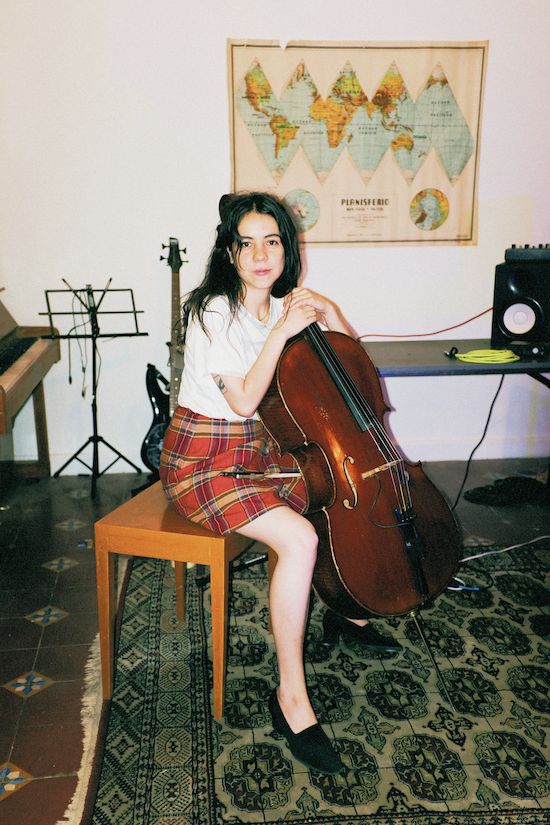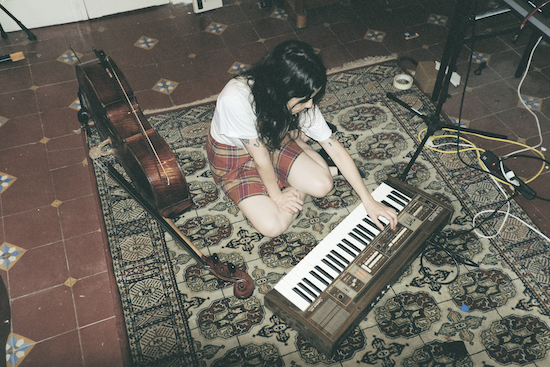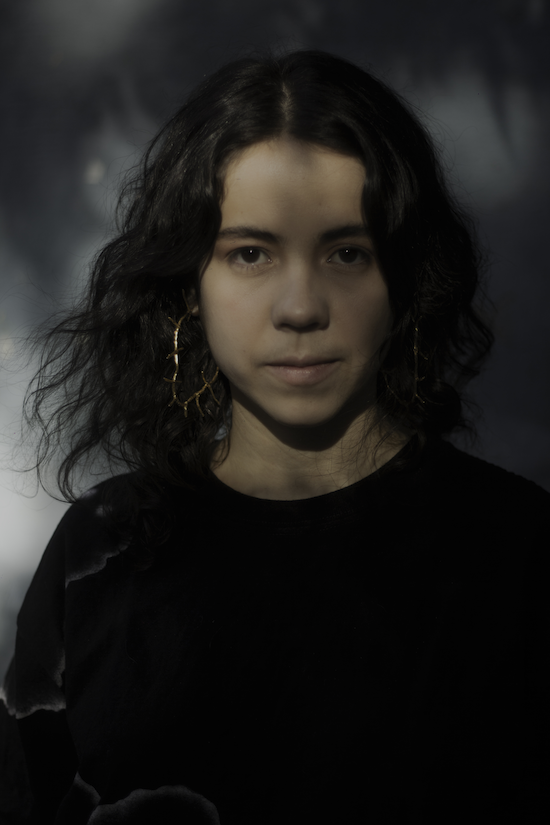Guatemala-born, Mexico-based artist and composer Mabe Fratti enjoys asking questions, always interjecting her thoughts with an inquisitive ‘right?’ Even when her music unfolds as an abrasive, barbed wire cacophony, you can feel an inherent kindness and generosity palpitating from within. It’s music attuned to the most intimate of human sensations.
Fratti wields her main instrument, the cello, like a sonic relayer, granting her surroundings agency in how her music takes shape and progresses. Some artists prefer to be hands on and mould those impulses into an uncompromising vision, but Fratti is quite remarkable in that her creativity is oftentimes fuelled by surrender. In some ways, her compositions can be likened to a human-made structure overgrown with luscious plant life and fungi; intent simpatico with instinct.
Above all, Fratti’s work is as selfless, adventurous and open-hearted as experimental pop music can get. Her previous album Sera que ahora podremos entendernos (‘Will we be able to understand each other now?’) was conceived at La Orduña, an abandoned juice factory turned artist residency near the city of Veracruz. At the time, Fratti wasn’t even planning to record an album. Inspired by the undomesticated forest environment and her struggles to communicate with the other artists staying there, the music poured out of her at its own admission. Tracks like ‘Hacia El Vacío’ and ‘En Medio’ resonate like candid attempts to reach a deeper connection, one that goes beyond the binary of verbal language.
If Fratti’s previous album was an attempt to understand her environment, her upcoming LP Se Ve Desde Aqui (‘It Is Seen From Here’) signifies the inverse: how her environment helps her understand herself. Unsurprisingly, Fratti’s close collaborators have been important catalysts: guitarist Héctor Tosta, drummer, Gibrán Andrade, saxophonist Jarrett Gilgore, violinist Alina Maldonado, producer Hugo Quezada (of Mexican noise rockers Exploded View) and artist Carla Boregas (of Brazilian punks Rakta). Furthermore, some of the more suspenseful tracks were conceived at WORM Sound Studios in Rotterdam using a vast array of synths, including the elusive KORG PS 3200 and CS 60.
When we connect over Zoom, Fratti has just toured through Mexico with another outfit she performs in, Amor Muere, which also features fellow composer Concepción Huerta, violinist Gibrana Cervantes and sound artist Camille Mandoki.
What’s the premise of Amor Muere? Is it a band based on songwriting or is it more rooted in improvisation?
Mabe Fratti: We just released one song, but we didn’t like that version of the song so we recorded it again. We do have a songwriting process, but it all starts with playing together. It’s a very soft process. We suggest things to one another, it’s not like super organised, or someone saying ‘you have to do this now’. It’s more about personal initiatives, so sometimes it could feel very improvised, because we repeat the same motifs or we have tracks or beats. We always have something to go back to.
It seems like we all have this process of being fundamentally caring about the other, not being egotistical or narcissists, which I feel we all are in a way. We do have our conflicts and everything, but we try to keep that within the conversation. And we try to go back to our friendship, of being very kind to one another. It’s kind of how it is naturally.
Are there specific things you didn’t want to do on your new album that you did on the previous one?
MF: Yeah, I did but… I broke the rules! No overdubs of my voice, no overdubs of my cello, and I started to work with that. Some songs I did this, but with some songs I felt like ‘This needs to sound like a choir!’, like a Beach Boys kind of choir. I feel like at least working with that strict vision made the record sound a little bit how it is. Because I wanted it to be dry, with less spaciality. I once heard this interview with Oneohtrix Point Never and he mentioned it pretty nicely; any sound effect that is a simulation of a space, like reverb or delay. As the passage of time goes – from my first record to my second to this one – I always try to lower it more and more. I wanted it to sound dryer and dryer.

Was there a lot of post-production involved, manipulating things afterwards?
MF: I always mix my own records because I get very creative in that part of the process. I wanted to make everything sound very clear. One of my friends in Amor Muere, Camille Mandoki, recorded me with some microphones that were amazing. I thought I needed some good microphones so I spent a lot of money! I think it’s more expensive than my cello. Like 2,000 dollars. I never spent so much money in my life, and that was like, two microphones! They were very hi-fi, and my idea was to sound very clear. I do like the idea of a very dirty sound, but in this clearness it almost starts to sound dirty. It’s like when you see yourself in a very hi-fi mirror with very hi-fi lights and you notice all the little imperfections. That’s what I wanted to try. But I don’t know if I achieved it.
Did the way people talked about your last record give you more clarity on what it is that you do, and how you want to develop or challenge that?
MF: On Sera que ahora podremos entendernos I felt very comfortable with my melodies and with what I was doing. With this new album it wasn’t as comfortable, because I was working with this specific idea. And I was always fighting on whether or not I was achieving it. I was having a lot of fights with myself. Then my partner Héctor [Tosta] would come in and say ‘Hey, this sounds great!’ and I was like ‘Okay, this is great now that you’re here with me!’. Melodically I wanted to go to another place, and evade certain motifs that I play. Like sometimes, for instance, I feel like Björk. She always has some kind of melody that sounds very clear, and I immediately know that it’s her. And I wanted to avoid that, because I do know that it’s good that you have your own sounds. But it’s also good to put myself in an uncomfortable position, with this album I think I did that.
Was making this record also a vital thing in terms of what you were going through outside of making music?
MF: Hmm, it definitely made me think about my next step. Maybe that was the uncomfortable part, this conflict that I was feeling: about who I want to be and who I actually am. What is the music that I want to do and what is the music that I actually make? This conflict of comparison, what I was telling you about these ideas I had.
And that’s everything I talk about on the record. In that particular moment, in my personal life, my family was in a very weird situation, there were many things in reconfiguration, in this idea of change. If I wanted to change, why do I want to change? How does change happen? That’s everything I talk about on the record, but from different perspectives. Like when change is good, or when change is forceful.
There’s a poem in Allen Ginsberg’s Howl called ‘America’, and there’s a part in it that goes, “Stop pushing, America. Stop pushing.” It pushes you to go with the flow of the very crazy world. I took the phrase ‘Stop pushing’. Sometimes change can be a push at a time when you don’t really want to change. Just changing with the push. So I took ideas from different perspectives, the idea of self-change, or change in general.

Does the ‘push’ also relate to your position as an artist, and how art gets treated these days? I feel a lot of artists are forced into these machineries that might suit them ill. This record feels way more chaotic, less from a stationary space; did it force you to think on your feet a bit more?
MF: Yeah, actually in my previous record, I was in a more stable situation. Rather in the pandemic, it felt like nothing was going on while I was in Veracruz, which was a very chill place. And the other time, I was making a record in my room, you know? On this one, I was working way more. I feel the world came back this year with a steroid kind of energy. Everything people didn’t do during the pandemic, people were like ‘I want to do it now!’ like a congestion of stuff that was finally released. As I was making the record I felt that pressure, but at the same time I was pressuring myself. And I was trying not to. So I felt this existential conflict as I was recording.
That was beautiful about working with Héctor as well. I like having conversations not just with myself, as I can be very self-critical. It was very useful actually, to throw the ball to someone else, and to ask questions to someone else other than myself. The situation was obviously very different, but I had the chance to record in WORM, for instance, which was an amazing experience. And to work with Hugo [Quezada], who plays in Exploded View. He has a studio with a mellotron and a Jupiter-8, all these old instruments he finds in the trash sometimes. He’s just like a hunter and an amazing person.
Last year you also made a record with Gudrun Gut, Let’s Talk About the Weather. Have you stayed in touch with her?
MF: Sometimes we send each other mail to say “Hi how are you?” She listened to this record, and she suggested the order of the songs, the sequencing of the album. It was her idea. Everything she says I trust, she is a queen. We met here in Mexico seven years ago, and we had a connection. At that moment, I was very nervous, I had to leave Guatemala, and I remember I was very quiet. I was talking to Gudrun, and she was so cool. I love her. Yeah, we always kept in touch, and she did a remix of a song I did ages ago. The album was for an online residency, and that’s how we made this record. Working with her is amazing. She’s the kind of person I want to grow up to be.
Mabe Fratti performs as part of Le Guess Who? Festival in Utrecht, Netherlands, which takes place November 10-13. For tickets and full information, here
Mabe Fratti’s new album Se Ve Desde Aqui is out now via Tin Angel Records. She performs as part of Le Guess Who? Festival in Utrecht, Netherlands, which takes place November 10-13. For tickets and full information, here


